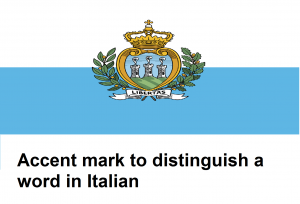Difference between revisions of "Language/Italian/Grammar/Accent-mark-to-distinguish-a-word"
Jump to navigation
Jump to search
(Accent mark to distinguish a word in Italian) |
(Accent mark to distinguish a word) |
||
| Line 4: | Line 4: | ||
Hello everybody, | Hello everybody, | ||
In today's lesson you will learn some useful vocabulary about ''' | In today's lesson you will learn some useful vocabulary about '''¨Accent mark to distinguish a word¨''' in Italian | ||
Feel free to edit this page by adding new words and expressions ! | Feel free to edit this page by adding new words and expressions ! | ||
| Line 144: | Line 144: | ||
|Pronome | |Pronome | ||
|} | |} | ||
I want to give you a list of monosyllables which have a different meaning when they are unaccented or accented. | I want to give you a list of monosyllables which have a different meaning when they are unaccented or accented. | ||
| Line 158: | Line 157: | ||
== Here are some examples: ☺ == | === <u>'''Here are some examples''': ☺</u> === | ||
{| class="wikitable" | |||
!English | |||
!The doctor comes '''from''' Milan / The grandmother '''gives''' the child a candy | |||
|- | |||
|Italian | |||
|Il dottore viene '''da''' Milano / La nonna '''dà''' una caramella al bambino | |||
|- | |||
|Brazilan Portuguese | |||
|O doutor veio '''de''' Milão / A avó '''dá''' um doce pra criança | |||
|} | |||
. | |||
{| class="wikitable" | |||
!English | |||
!I studied '''all day''' / I have a bracelet '''of''' copper | |||
|- | |||
|Italian | |||
|Io ho studiato '''tutto il dì''' / Io ho un braccialetto '''di''' rame | |||
|- | |||
|Brazilan Portuguese | |||
|Estudei o '''dia todo''' / tenho uma pulseira '''de''' cobre. | |||
|} | |||
. | |||
{| class="wikitable" | |||
!English | |||
!Mario '''and''' Luca are friends / The pilot '''is''' careful | |||
|- | |||
|Italian | |||
|Mario '''e''' Luca sono amici / Il pilota '''è''' attento | |||
|- | |||
|Brazilan Portuguese | |||
|Mário '''e''' Lucas são amigos / O piloto '''é''' cuidadoso | |||
|} | |||
. | |||
{| class="wikitable" | |||
!English | |||
!I know '''them''' recently / I go '''out there.''' | |||
|- | |||
|Italian | |||
|'''Li''' conosco da poco / Vado '''lì fuori.''' | |||
|- | |||
|Brazilan Portuguese | |||
|Conheço '''eles''' a pouco / Eu vou '''lá fora''' | |||
|} | |||
. | |||
{| class="wikitable" | |||
!English | |||
!Mom is '''at''' work / Put it '''there''', near the desk | |||
|- | |||
|Italian | |||
|La mamma è '''a''' lavoro / Posalo '''là''', vicino la scrivania | |||
|- | |||
|Brazilan Portuguese | |||
|Minha mãe está '''ao''' trabalho / Deixe '''lá''', perto da escrivaninha | |||
|} | |||
. | |||
{| class="wikitable" | |||
!English | |||
!He carried the bag '''with him''' / '''If''' you were in my place | |||
|- | |||
|Italian | |||
|Portò la borsa '''con sè''' / '''Se''' tu fossi al mio posto | |||
|- | |||
|Brazilan Portuguese | |||
|Ele portou a bolsa '''consigo''' / '''Se''' você estivesse em meu lugar | |||
|} | |||
. | |||
{| class="wikitable" | |||
!English | |||
!'''Yes''', I'm here / He looked '''himself''' in the mirror | |||
|- | |||
|Italian | |||
|'''Sì''', sono qui / '''Si''' guardò allo specchio | |||
|- | |||
|Brazilan Portuguese | |||
|'''Sim''', Eu estou aqui / Ele '''se''' olhou ao espelho | |||
|} | |||
. | |||
{| class="wikitable" | |||
!English | |||
!'''Neither''' this '''nor''' that work ♣ I '''neither''' received a part of it | |||
|- | |||
|Italian | |||
|Non funzionano '''né''' questo '''né''' quello ♣ '''Ne''' ho ricevuto una parte | |||
|- | |||
|Brazilan Portuguese | |||
|'''Nem''' isso '''nem''' aquilo funciona / Eu '''nem''' recebi parte de isso | |||
|} | |||
. | |||
{| class="wikitable" | |||
!English | |||
!Do you want a cup of '''tea'''? ♣ I come to '''you''' at five | |||
|- | |||
|Italian | |||
|Vuoi una tazza di '''tè'''? ♣ Vengo da '''te''' alle cinque | |||
|- | |||
|Brazilan Portuguese | |||
|Você quer uma xícara do '''chá''' / Venho até '''tu''' as cinco | |||
|} | |||
Revision as of 23:54, 2 May 2020
.
Hello everybody,
In today's lesson you will learn some useful vocabulary about ¨Accent mark to distinguish a word¨ in Italian
Feel free to edit this page by adding new words and expressions !
Good learning ! :)
.
.
.
.
.
.
.
.
Some words for Accent mark to distinguish a word in Italian
| ENGLISH | PRONUNCIATION
ENGLISH |
ITALIAN | PRONUNCIATION
BRAZILIAN PORTUGUESE |
BRAZILIAN
PORTUGUESE |
|---|---|---|---|---|
| Preposition | dah | DA | dá | Preposição |
| Third person of the verb to give | dah | DÀ | dá | Terceira pessoa do verbo dar |
| Noun | dih | DÌ | dí | Substantivo |
| Preposition | dih | Dİ | dí | Preposição |
| Conjuction | eh | E | e | Conjunção |
| Third person of the verb to be | eh | È | é | Terceira pessoa do verbo ser |
| Pronoun | lih | Lİ | lí | Pronome |
| Adverb | lih | LÌ | lí | Advérbio |
| Pronoun | lah | LA | la | Pronome |
| Adverb | lah | LÀ | la | Advérbio |
| Conjuction | seh | SÉ | se | Conjunção |
| Pronoun | seh | SE | se | Pronome |
| Conjuction | neh | NÉ | ne | Conjunção |
| Pronoun or adverb | neh | NE | ne | Pronome ou advérbio |
| Noun of the plant and
the infusion |
teh | TÈ | té | Substantivo da planta e
infusão |
| Pronoun | teh | TE | te | Pronome |
I want to give you a list of monosyllables which have a different meaning when they are unaccented or accented.
- da (preposition) ♣ dà (third person of the verb to give)
- dì (noun) ♣ di (preposition)
- e (conjunction) ♣ è (third person of the verb to be)
- li (pronoun) ♣ lì (adverb)
- la (pronoun) ♣ là (adverb)
- sé (conjunction) ♣ se (pronoun)
- sì (adverb) ♣ si (pronoun)
- né (conjunction) ♣ ne (pronoun or adverb)
- tè (noun of the plant and the infusion) ♣ te (pronoun)
Here are some examples: ☺
| English | The doctor comes from Milan / The grandmother gives the child a candy |
|---|---|
| Italian | Il dottore viene da Milano / La nonna dà una caramella al bambino |
| Brazilan Portuguese | O doutor veio de Milão / A avó dá um doce pra criança |
.
| English | I studied all day / I have a bracelet of copper |
|---|---|
| Italian | Io ho studiato tutto il dì / Io ho un braccialetto di rame |
| Brazilan Portuguese | Estudei o dia todo / tenho uma pulseira de cobre. |
.
| English | Mario and Luca are friends / The pilot is careful |
|---|---|
| Italian | Mario e Luca sono amici / Il pilota è attento |
| Brazilan Portuguese | Mário e Lucas são amigos / O piloto é cuidadoso |
.
| English | I know them recently / I go out there. |
|---|---|
| Italian | Li conosco da poco / Vado lì fuori. |
| Brazilan Portuguese | Conheço eles a pouco / Eu vou lá fora |
.
| English | Mom is at work / Put it there, near the desk |
|---|---|
| Italian | La mamma è a lavoro / Posalo là, vicino la scrivania |
| Brazilan Portuguese | Minha mãe está ao trabalho / Deixe lá, perto da escrivaninha |
.
| English | He carried the bag with him / If you were in my place |
|---|---|
| Italian | Portò la borsa con sè / Se tu fossi al mio posto |
| Brazilan Portuguese | Ele portou a bolsa consigo / Se você estivesse em meu lugar |
.
| English | Yes, I'm here / He looked himself in the mirror |
|---|---|
| Italian | Sì, sono qui / Si guardò allo specchio |
| Brazilan Portuguese | Sim, Eu estou aqui / Ele se olhou ao espelho |
.
| English | Neither this nor that work ♣ I neither received a part of it |
|---|---|
| Italian | Non funzionano né questo né quello ♣ Ne ho ricevuto una parte |
| Brazilan Portuguese | Nem isso nem aquilo funciona / Eu nem recebi parte de isso |
.
| English | Do you want a cup of tea? ♣ I come to you at five |
|---|---|
| Italian | Vuoi una tazza di tè? ♣ Vengo da te alle cinque |
| Brazilan Portuguese | Você quer uma xícara do chá / Venho até tu as cinco |

